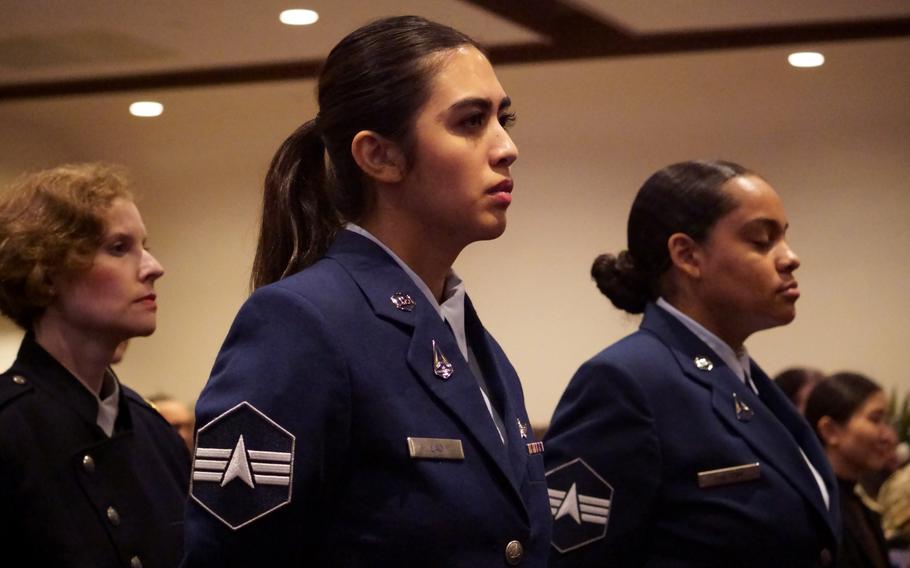
Guardians stand at attention during the activation ceremony of U.S. Space Forces Japan at Yokota Air Base in western Tokyo on Dec. 4, 2024. (Akifumi Ishikawa/Stars and Stripes)
YOKOTA AIR BASE, Japan — The U.S. Space Force established a new command Wednesday in western Tokyo as the United States and Japan seek space superiority in the region.
A flag featuring the mountain-rocket insignia of U.S. Space Forces Japan unfurled in front of American and Japanese troops and civilian dignitaries during an activation ceremony at the Yokota Officers’ Club.
“It’s a big day for the U.S. Space Force,” the commander of U.S. Forces Japan, Air Force Lt. Gen. Stephen Jost, said at the ceremony.
Brig. Gen. Anthony Mastalir, head of the Hawaii-based U.S. Space Forces Indo-Pacific, passed the new unit’s colors to its first commander, Col. Ryan Laughton, before the Yokota guardians saluted and sang the Space Force song.
Laughton, a Wyoming native, taught English in Gunma prefecture, Japan, before joining the Air Force. He has experience in space launch, operations and acquisitions and worked as an engineer, instructor, executive officer, flight commander, satellite manager, operations analyst, branch chief and materiel leader, according to his official biography.
“We are committed to being a force multiplier across the space domain,” he said during the inauguration of his unit.
Created in December 2019 under President Donald Trump, the Space Force, the U.S. military’s newest service branch, now has more than 14,000 personnel. Its missions include tracking threats to the U.S. homeland and safeguarding American satellites.
The Yokota-based unit is composed of tens, not hundreds, of guardians, Mastalir told reporters at the air base Tuesday without providing a precise number.
“It’s a big day for U.S. Forces Japan and it’s a big day for the United States-Japan alliance,” Jost told the gathering, which included members of Japan’s relatively new Space Operations Group from nearby Fuchu Air base.
“As we officially activate U.S. Space Forces Japan, today marks a new chapter in our commitment to defending the space domain,” he said.
Rapid developments in space have driven the need for the new command focused on communications, space resilience, navigation and missile defense, Jost said.
“The challenges we face in the space domain are real,” he said, noting that Russia began its ongoing war in Ukraine by launching a cyberattack on the country’s satellite operations.
In addition to threats from North Korea and Russia, China continues to engage in illegal, coercive and deceptive tactics that threaten the stability of the Indo-Pacific, Mastalir said at the ceremony.
The new unit is a command-and-control operational headquarters. The joint operations command being established by Japan and a reorganized USFJ will need to integrate space into their operations, he said.
“We are determined to integrate across the joint force with our allies,” he said.
The U.S. and Japan are “spacefaring nations” that have cooperated on civilian space ventures for decades, Mastalir added.
The allies will see increased access to secure, anti-jamming, high-capacity communication from satellite launches. Japan will launch its first space domain awareness satellite in 2026, he said.
“U.S. Space Forces Japan will serve as a focal point for deepening collaboration between the U.S. and Japan in the national security sphere,” he said. “These partnership efforts send a message to any potential adversaries that the U.S.-Japan alliance is stronger than ever.”